Unit 6 Seasons Lesson 35 Surfing in Sydney 教学设计
文档属性
| 名称 | Unit 6 Seasons Lesson 35 Surfing in Sydney 教学设计 | 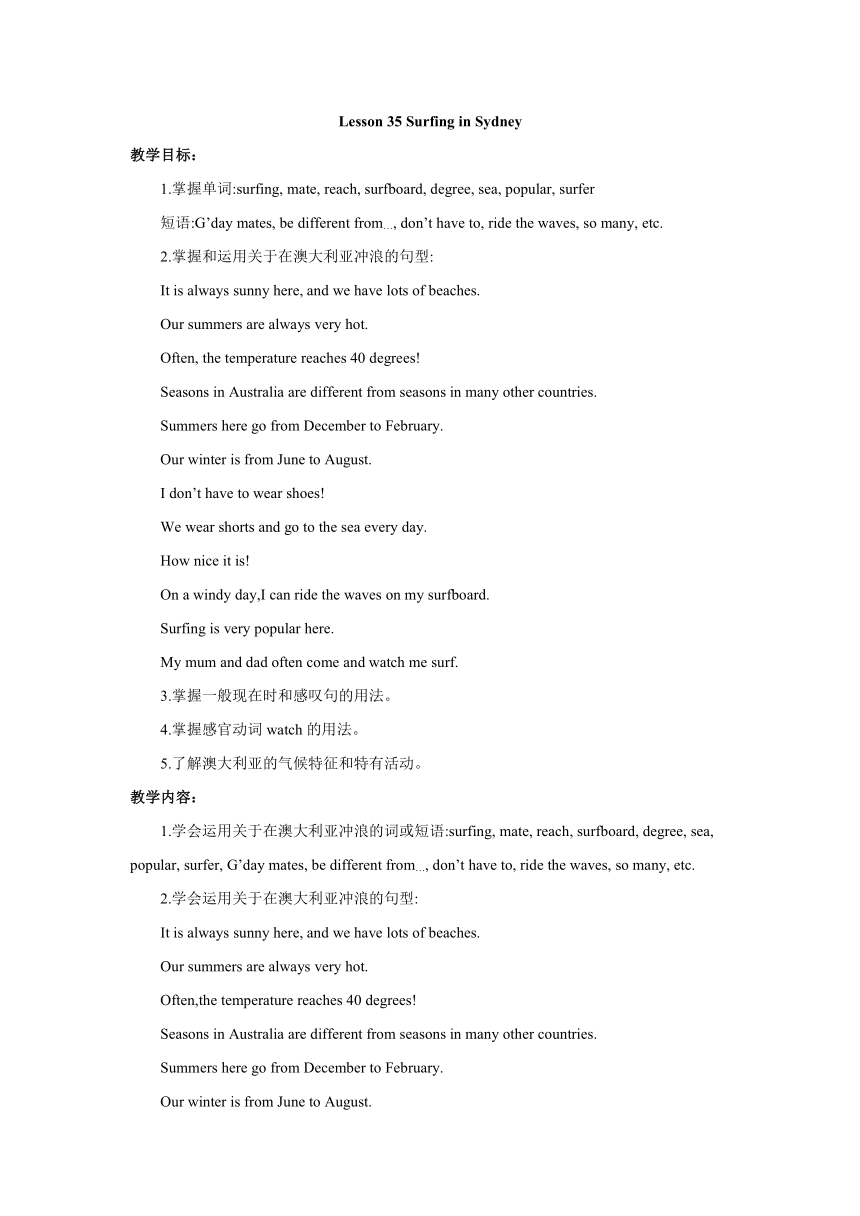 | |
| 格式 | zip | ||
| 文件大小 | 28.7KB | ||
| 资源类型 | 教案 | ||
| 版本资源 | 冀教版 | ||
| 科目 | 英语 | ||
| 更新时间 | 2019-06-27 16:56:27 | ||
图片预览

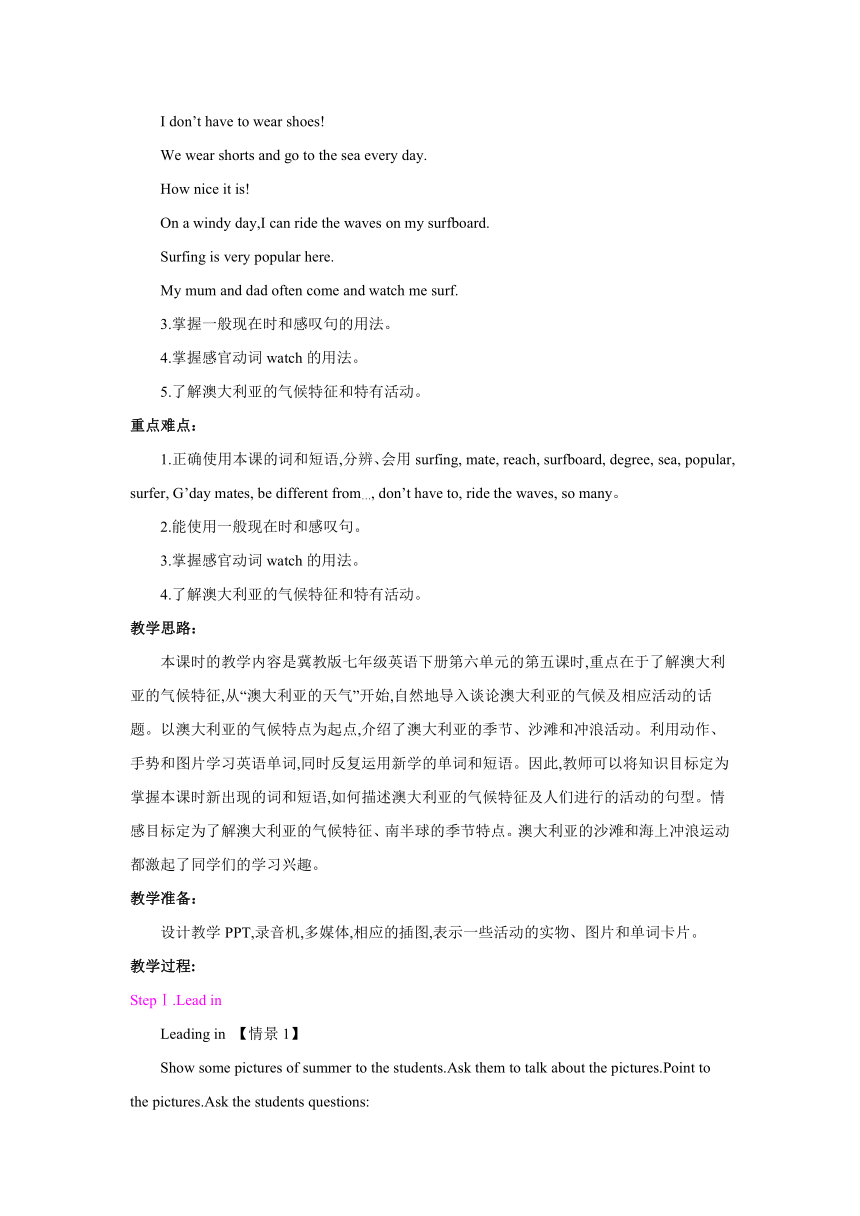
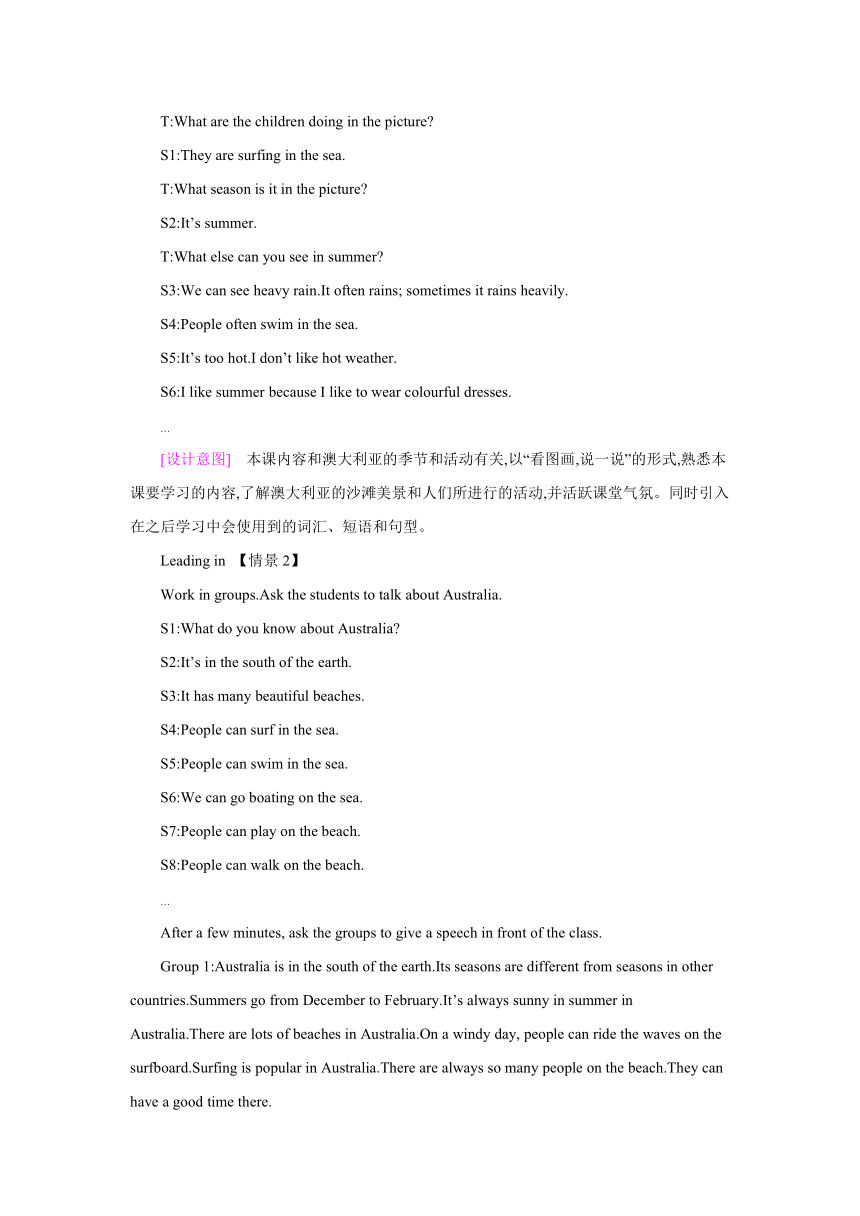
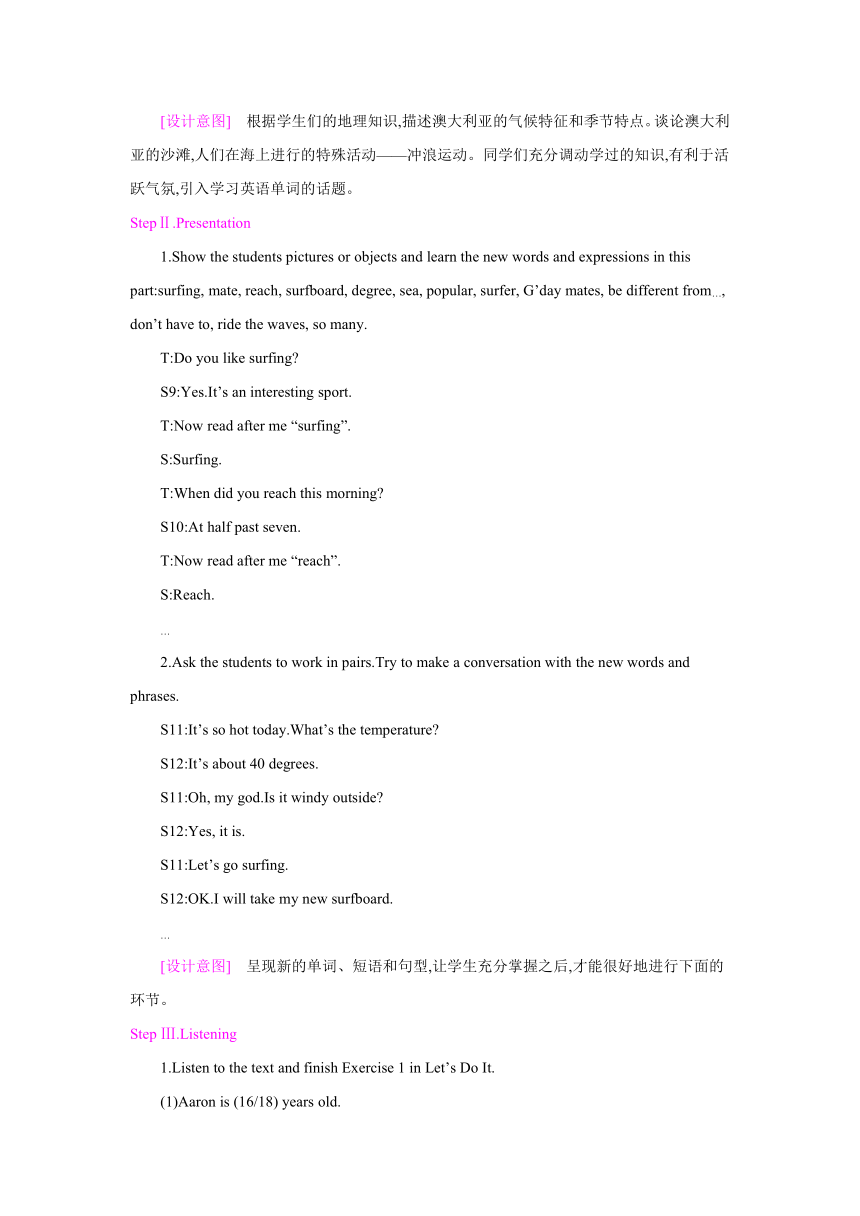
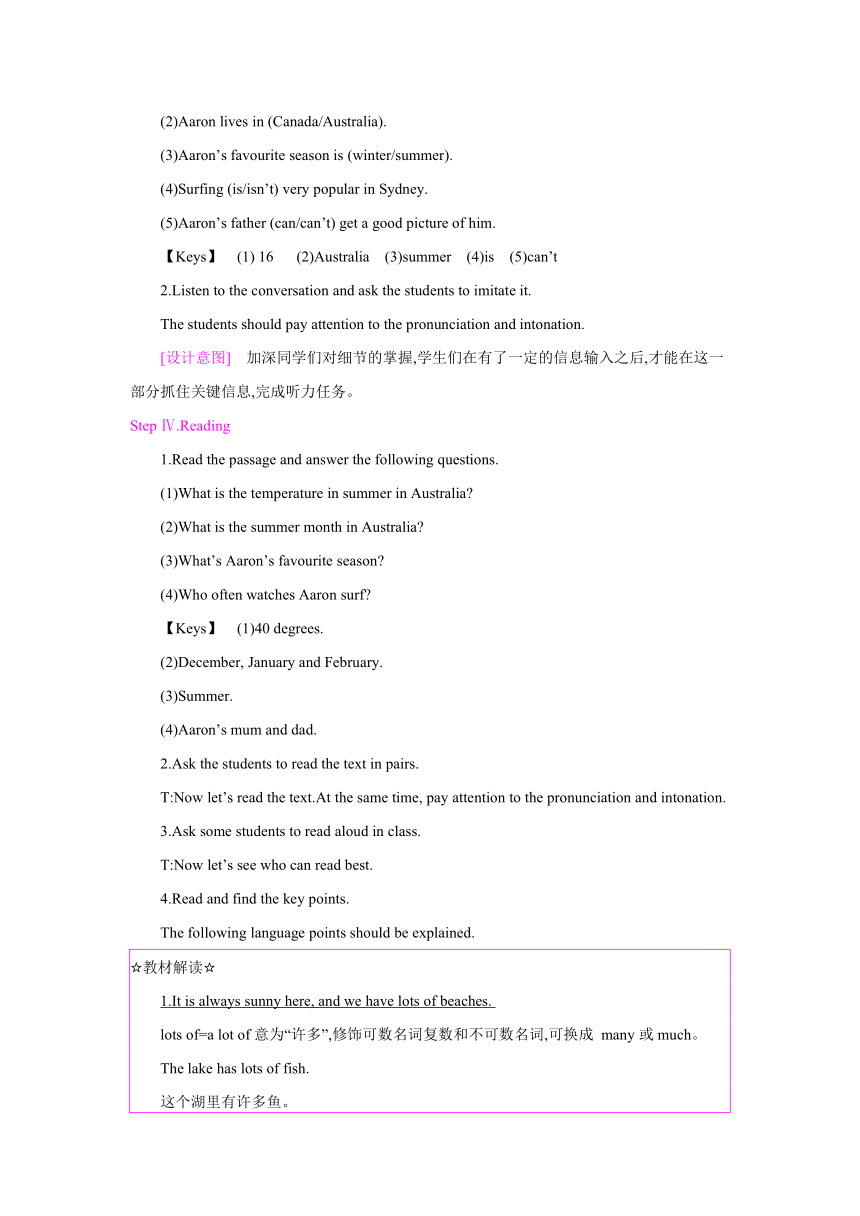
文档简介
Lesson 35 Surfing in Sydney
教学目标:
1.掌握单词:surfing, mate, reach, surfboard, degree, sea, popular, surfer
短语:G’day mates, be different from…, don’t have to, ride the waves, so many, etc.
2.掌握和运用关于在澳大利亚冲浪的句型:
It is always sunny here, and we have lots of beaches.
Our summers are always very hot.
Often, the temperature reaches 40 degrees!
Seasons in Australia are different from seasons in many other countries.
Summers here go from December to February.
Our winter is from June to August.
I don’t have to wear shoes!
We wear shorts and go to the sea every day.
How nice it is!
On a windy day,I can ride the waves on my surfboard.
Surfing is very popular here.
My mum and dad often come and watch me surf.
3.掌握一般现在时和感叹句的用法。
4.掌握感官动词watch的用法。
5.了解澳大利亚的气候特征和特有活动。
教学内容:
1.学会运用关于在澳大利亚冲浪的词或短语:surfing, mate, reach, surfboard, degree, sea, popular, surfer, G’day mates, be different from…, don’t have to, ride the waves, so many, etc.
2.学会运用关于在澳大利亚冲浪的句型:
It is always sunny here, and we have lots of beaches.
Our summers are always very hot.
Often,the temperature reaches 40 degrees!
Seasons in Australia are different from seasons in many other countries.
Summers here go from December to February.
Our winter is from June to August.
I don’t have to wear shoes!
We wear shorts and go to the sea every day.
How nice it is!
On a windy day,I can ride the waves on my surfboard.
Surfing is very popular here.
My mum and dad often come and watch me surf.
3.掌握一般现在时和感叹句的用法。
4.掌握感官动词watch的用法。
5.了解澳大利亚的气候特征和特有活动。
重点难点:
1.正确使用本课的词和短语,分辨、会用surfing, mate, reach, surfboard, degree, sea, popular, surfer, G’day mates, be different from…, don’t have to, ride the waves, so many。
2.能使用一般现在时和感叹句。
3.掌握感官动词watch的用法。
4.了解澳大利亚的气候特征和特有活动。
教学思路:
本课时的教学内容是冀教版七年级英语下册第六单元的第五课时,重点在于了解澳大利亚的气候特征,从“澳大利亚的天气”开始,自然地导入谈论澳大利亚的气候及相应活动的话题。以澳大利亚的气候特点为起点,介绍了澳大利亚的季节、沙滩和冲浪活动。利用动作、手势和图片学习英语单词,同时反复运用新学的单词和短语。因此,教师可以将知识目标定为掌握本课时新出现的词和短语,如何描述澳大利亚的气候特征及人们进行的活动的句型。情感目标定为了解澳大利亚的气候特征、南半球的季节特点。澳大利亚的沙滩和海上冲浪运动都激起了同学们的学习兴趣。
教学准备:
设计教学PPT,录音机,多媒体,相应的插图,表示一些活动的实物、图片和单词卡片。
教学过程:
StepⅠ.Lead in
Leading in 【情景1】
Show some pictures of summer to the students.Ask them to talk about the pictures.Point to the pictures.Ask the students questions:
T:What are the children doing in the picture?
S1:They are surfing in the sea.
T:What season is it in the picture?
S2:It’s summer.
T:What else can you see in summer?
S3:We can see heavy rain.It often rains; sometimes it rains heavily.
S4:People often swim in the sea.
S5:It’s too hot.I don’t like hot weather.
S6:I like summer because I like to wear colourful dresses.
…
[设计意图] 本课内容和澳大利亚的季节和活动有关,以“看图画,说一说”的形式,熟悉本课要学习的内容,了解澳大利亚的沙滩美景和人们所进行的活动,并活跃课堂气氛。同时引入在之后学习中会使用到的词汇、短语和句型。
Leading in 【情景2】
Work in groups.Ask the students to talk about Australia.
S1:What do you know about Australia?
S2:It’s in the south of the earth.
S3:It has many beautiful beaches.
S4:People can surf in the sea.
S5:People can swim in the sea.
S6:We can go boating on the sea.
S7:People can play on the beach.
S8:People can walk on the beach.
…
After a few minutes, ask the groups to give a speech in front of the class.
Group 1:Australia is in the south of the earth.Its seasons are different from seasons in other countries.Summers go from December to February.It’s always sunny in summer in Australia.There are lots of beaches in Australia.On a windy day, people can ride the waves on the surfboard.Surfing is popular in Australia.There are always so many people on the beach.They can have a good time there.
[设计意图] 根据学生们的地理知识,描述澳大利亚的气候特征和季节特点。谈论澳大利亚的沙滩,人们在海上进行的特殊活动——冲浪运动。同学们充分调动学过的知识,有利于活跃气氛,引入学习英语单词的话题。
StepⅡ.Presentation
1.Show the students pictures or objects and learn the new words and expressions in this part:surfing, mate, reach, surfboard, degree, sea, popular, surfer, G’day mates, be different from…, don’t have to, ride the waves, so many.
T:Do you like surfing?
S9:Yes.It’s an interesting sport.
T:Now read after me “surfing”.
S:Surfing.
T:When did you reach this morning?
S10:At half past seven.
T:Now read after me “reach”.
S:Reach.
…
2.Ask the students to work in pairs.Try to make a conversation with the new words and phrases.
S11:It’s so hot today.What’s the temperature?
S12:It’s about 40 degrees.
S11:Oh, my god.Is it windy outside?
S12:Yes, it is.
S11:Let’s go surfing.
S12:OK.I will take my new surfboard.
…
[设计意图] 呈现新的单词、短语和句型,让学生充分掌握之后,才能很好地进行下面的环节。
Step Ⅲ.Listening
1.Listen to the text and finish Exercise 1 in Let’s Do It.
(1)Aaron is (16/18) years old.
(2)Aaron lives in (Canada/Australia).
(3)Aaron’s favourite season is (winter/summer).
(4)Surfing (is/isn’t) very popular in Sydney.
(5)Aaron’s father (can/can’t) get a good picture of him.
【Keys】 (1) 16 (2)Australia (3)summer (4)is (5)can’t
2.Listen to the conversation and ask the students to imitate it.
The students should pay attention to the pronunciation and intonation.
[设计意图] 加深同学们对细节的掌握,学生们在有了一定的信息输入之后,才能在这一部分抓住关键信息,完成听力任务。
Step Ⅳ.Reading
1.Read the passage and answer the following questions.
(1)What is the temperature in summer in Australia?
(2)What is the summer month in Australia?
(3)What’s Aaron’s favourite season?
(4)Who often watches Aaron surf?
【Keys】 (1)40 degrees.
(2)December, January and February.
(3)Summer.
(4)Aaron’s mum and dad.
2.Ask the students to read the text in pairs.
T:Now let’s read the text.At the same time, pay attention to the pronunciation and intonation.
3.Ask some students to read aloud in class.
T:Now let’s see who can read best.
4.Read and find the key points.
The following language points should be explained.
☆教材解读☆
1.It is always sunny here, and we have lots of beaches.?
lots of=a lot of意为“许多”,修饰可数名词复数和不可数名词,可换成 many或much。
The lake has lots of fish.
这个湖里有许多鱼。
Yesterday he ate a lot of fish.
昨天他吃了许多鱼肉。
2.Often, the temperature reaches 40 degrees!?
【辨析】 reach, arrive,get
(1)reach 通常是及物动词(较 get 更正式),其后可直接跟地点名词作宾语(不能用介词)。
He reached Beijing yesterday.
他昨天到达北京。
【注意】 reach 之后也可接 here, there, home 等词。
When did he reach home yesterday?
昨天他什么时候到家的?
(2)reach 除可表示到达某地外,还用于其他意义的到达。
He has reached school age.
他已达到上学年龄了。
(3)arrive 之后通常接介词 at (一般用于较小的地方)或 in (一般用于较大的地方)。
We arrived at the station five minutes late.
我们到车站晚了 5 分钟。
They will arrive in Paris next Monday.
他们将于下星期一到达巴黎。
(4)get 之后通常接介词 to。
When we got to the park, it began to rain.
我们到达公园时,就开始下雨了。
3.Seasons in Australia are different from seasons in many other countries.?
be different from意为“和……不同”。different用作形容词,意为“不同的”。
My pen is different from yours.
我的钢笔和你的不同。
【拓展】 difference用作名词,意为“不同之处”;differently用作副词,意为“不同地”。
There are many differences between the two dresses.这两条连衣裙之间有很多不同之处。
4.I don’t have to wear shoes!?
have to意为“必须;不得不”,接动词原形。
It’s late.I have to go home now.
天晚了。我现在不得不回家。
【拓展】 don’t have to意为“不必”,它的同义词是needn’t 。
You don’t have to take a bus to school.I can drive you there.你不必乘公共汽车去上学。我能开车送你去那里。
5.It is difficult, but very good exercise.?
exercise用作不可数名词,意为“锻炼,运动”。
He takes exercise every week.
他每周都坚持锻炼。
【拓展】 exercise还可以用作可数名词,意为“练习,一套操 ”。
The children are doing eye exercises.
孩子们在做眼保健操。
The students usually do some exercises in class.通常学生们在课堂上做一些练习。
6.My mum and dad often come and watch me surf.?
watch sb.do sth.意为“观看某人做某事”。
I watched him go, and then I went home.
我看见他走了,然后才回家。
【拓展】 (1)watch sb./sth.doing sth.意为“看某人/某物正在做某事”,-ing形式表示正在进行的动作或活动。
She watched the children playing in the yard.她看着孩子们在院子里玩。
(2) 其他类似用法还有:see sb.do/doing sth. 看见某人做/正在做某事,hear sb.do/doing sth.听见某人做/正在做某事。
I hear him singing.我听见他在唱歌。
[设计意图] 读文章回答问题,找出问题的答案,设计这样的阅读题有助于学生理解文章细节。
StepⅤ.Practice
1.Retell the story.Ask the students to retell the text.Ask a few students to try in class.
2.Work in pairs.Create a new dialogue about their favourite seasons.Ask a few pairs to act them out in front of the class.
S13:What do you often do in summer?
S14:I often swim in the river.What about you?
S13:I often read books at home.
…
3.Make sentences with the new words, expressions and grammars.
[设计意图] 利用实物或图片创设对话,创设不同的场景,谈论英语在日常生活中的作用,让同学们有机会进行多方面的口语练习。根据知识点造句可以查漏补缺,巩固所学知识。
Step Ⅵ.Complete Let’s Do It!
Exercise 1 is listening part.We have finished it in class.Exercise 2 is about words.Exercise 3 is about the expressions of the text.Exercise 4 is to find the sentences with the same meanings.Check the answers in class.
[设计意图] Let’s Do It!部分中的Exercise 1是练习听力,我们在听力部分已经完成了。Exercise 2是练习本课的重要单词,考查单词的使用场合。Exercise 3考查本课的短语的用法。Exercise 4是练习本课的主要句型。
Step Ⅶ.Task
Pair work:Let’s Do It! Exercise 4.
Work in groups.In your opinion, what is the most popular sport in China? Can you play it in any season? Discuss and present your answers to the class.
Ask the students to discuss in groups.Create more dialogues.After a few minutes, ask some groups to act their dialogues out in front of the class.
[设计意图] 小组合作,列举在中国最受欢迎的运动,能在每个季节都做这项运动吗?练习感叹句、一般将来时和本课学到的单词、短语和句型。
Step Ⅷ.Exercises
Fill in the blanks.
1.温度经常达到40摄氏度!
Often,the temperature 40 ! ?
2.澳大利亚的季节与其他许多国家的季节不同。
Seasons in Australia seasons in countries.?
3.冲浪在这儿很受欢迎。
Surfing very here.?
4.我爸爸妈妈经常来看我冲浪。
My mum and dad often me .?
5.他从未给我拍过一张完美的照片。
He can get me.?
【Keys】 1.reaches, degrees 2.are different from, many other 3.is, popular 4.come and watch, surf 5.never, a good picture of
[设计意图] 以学评教、强化落实。当堂检测主要是由本节内容组成的形成性评价,让学生们巩固本课所学内容。
Step Ⅸ.Homework
1.Remember the words and phrases in this lesson.
2.Read the text after class.
3.Prepare for the next lesson.
[设计意图] 复习、归纳课本内容,课下练习是非常必要的。
Lesson 35 Surfing in Sydney
surfing, mate,reach, surfboard,
degree, sea, popular, surfer, G’day mates,
be different from…, so many,
don’t have to, ride the waves
Our summers are always very hot.
Often,the temperature reaches 40 degrees.
I don’t have to wear shoes!
Our winter is from June to August.
How nice it is!
We wear shorts and go to the sea every day.
Surfing is very popular here.
Summers here go from December to February.
My mum and dad often come and watch me surf.
It is always sunny here, and we have lots of beaches.
On a windy day,I can ride the waves on my surfboard.
Seasons in Australia are different from seasons in many other countries.
教材习题解答
【Keys】2 reach—get to; arrive at; popular—be liked by many people; degrees—a word to describe temperature; sea—a big body of water
3 1.lots of beaches 2.are different from 3.December to February 4.good exercise 5.a great surfer
4 1.I like summer best.
2.Many people here like to go surfing.
3.The weather in Beijing and Chengdu is not the same.
教学目标:
1.掌握单词:surfing, mate, reach, surfboard, degree, sea, popular, surfer
短语:G’day mates, be different from…, don’t have to, ride the waves, so many, etc.
2.掌握和运用关于在澳大利亚冲浪的句型:
It is always sunny here, and we have lots of beaches.
Our summers are always very hot.
Often, the temperature reaches 40 degrees!
Seasons in Australia are different from seasons in many other countries.
Summers here go from December to February.
Our winter is from June to August.
I don’t have to wear shoes!
We wear shorts and go to the sea every day.
How nice it is!
On a windy day,I can ride the waves on my surfboard.
Surfing is very popular here.
My mum and dad often come and watch me surf.
3.掌握一般现在时和感叹句的用法。
4.掌握感官动词watch的用法。
5.了解澳大利亚的气候特征和特有活动。
教学内容:
1.学会运用关于在澳大利亚冲浪的词或短语:surfing, mate, reach, surfboard, degree, sea, popular, surfer, G’day mates, be different from…, don’t have to, ride the waves, so many, etc.
2.学会运用关于在澳大利亚冲浪的句型:
It is always sunny here, and we have lots of beaches.
Our summers are always very hot.
Often,the temperature reaches 40 degrees!
Seasons in Australia are different from seasons in many other countries.
Summers here go from December to February.
Our winter is from June to August.
I don’t have to wear shoes!
We wear shorts and go to the sea every day.
How nice it is!
On a windy day,I can ride the waves on my surfboard.
Surfing is very popular here.
My mum and dad often come and watch me surf.
3.掌握一般现在时和感叹句的用法。
4.掌握感官动词watch的用法。
5.了解澳大利亚的气候特征和特有活动。
重点难点:
1.正确使用本课的词和短语,分辨、会用surfing, mate, reach, surfboard, degree, sea, popular, surfer, G’day mates, be different from…, don’t have to, ride the waves, so many。
2.能使用一般现在时和感叹句。
3.掌握感官动词watch的用法。
4.了解澳大利亚的气候特征和特有活动。
教学思路:
本课时的教学内容是冀教版七年级英语下册第六单元的第五课时,重点在于了解澳大利亚的气候特征,从“澳大利亚的天气”开始,自然地导入谈论澳大利亚的气候及相应活动的话题。以澳大利亚的气候特点为起点,介绍了澳大利亚的季节、沙滩和冲浪活动。利用动作、手势和图片学习英语单词,同时反复运用新学的单词和短语。因此,教师可以将知识目标定为掌握本课时新出现的词和短语,如何描述澳大利亚的气候特征及人们进行的活动的句型。情感目标定为了解澳大利亚的气候特征、南半球的季节特点。澳大利亚的沙滩和海上冲浪运动都激起了同学们的学习兴趣。
教学准备:
设计教学PPT,录音机,多媒体,相应的插图,表示一些活动的实物、图片和单词卡片。
教学过程:
StepⅠ.Lead in
Leading in 【情景1】
Show some pictures of summer to the students.Ask them to talk about the pictures.Point to the pictures.Ask the students questions:
T:What are the children doing in the picture?
S1:They are surfing in the sea.
T:What season is it in the picture?
S2:It’s summer.
T:What else can you see in summer?
S3:We can see heavy rain.It often rains; sometimes it rains heavily.
S4:People often swim in the sea.
S5:It’s too hot.I don’t like hot weather.
S6:I like summer because I like to wear colourful dresses.
…
[设计意图] 本课内容和澳大利亚的季节和活动有关,以“看图画,说一说”的形式,熟悉本课要学习的内容,了解澳大利亚的沙滩美景和人们所进行的活动,并活跃课堂气氛。同时引入在之后学习中会使用到的词汇、短语和句型。
Leading in 【情景2】
Work in groups.Ask the students to talk about Australia.
S1:What do you know about Australia?
S2:It’s in the south of the earth.
S3:It has many beautiful beaches.
S4:People can surf in the sea.
S5:People can swim in the sea.
S6:We can go boating on the sea.
S7:People can play on the beach.
S8:People can walk on the beach.
…
After a few minutes, ask the groups to give a speech in front of the class.
Group 1:Australia is in the south of the earth.Its seasons are different from seasons in other countries.Summers go from December to February.It’s always sunny in summer in Australia.There are lots of beaches in Australia.On a windy day, people can ride the waves on the surfboard.Surfing is popular in Australia.There are always so many people on the beach.They can have a good time there.
[设计意图] 根据学生们的地理知识,描述澳大利亚的气候特征和季节特点。谈论澳大利亚的沙滩,人们在海上进行的特殊活动——冲浪运动。同学们充分调动学过的知识,有利于活跃气氛,引入学习英语单词的话题。
StepⅡ.Presentation
1.Show the students pictures or objects and learn the new words and expressions in this part:surfing, mate, reach, surfboard, degree, sea, popular, surfer, G’day mates, be different from…, don’t have to, ride the waves, so many.
T:Do you like surfing?
S9:Yes.It’s an interesting sport.
T:Now read after me “surfing”.
S:Surfing.
T:When did you reach this morning?
S10:At half past seven.
T:Now read after me “reach”.
S:Reach.
…
2.Ask the students to work in pairs.Try to make a conversation with the new words and phrases.
S11:It’s so hot today.What’s the temperature?
S12:It’s about 40 degrees.
S11:Oh, my god.Is it windy outside?
S12:Yes, it is.
S11:Let’s go surfing.
S12:OK.I will take my new surfboard.
…
[设计意图] 呈现新的单词、短语和句型,让学生充分掌握之后,才能很好地进行下面的环节。
Step Ⅲ.Listening
1.Listen to the text and finish Exercise 1 in Let’s Do It.
(1)Aaron is (16/18) years old.
(2)Aaron lives in (Canada/Australia).
(3)Aaron’s favourite season is (winter/summer).
(4)Surfing (is/isn’t) very popular in Sydney.
(5)Aaron’s father (can/can’t) get a good picture of him.
【Keys】 (1) 16 (2)Australia (3)summer (4)is (5)can’t
2.Listen to the conversation and ask the students to imitate it.
The students should pay attention to the pronunciation and intonation.
[设计意图] 加深同学们对细节的掌握,学生们在有了一定的信息输入之后,才能在这一部分抓住关键信息,完成听力任务。
Step Ⅳ.Reading
1.Read the passage and answer the following questions.
(1)What is the temperature in summer in Australia?
(2)What is the summer month in Australia?
(3)What’s Aaron’s favourite season?
(4)Who often watches Aaron surf?
【Keys】 (1)40 degrees.
(2)December, January and February.
(3)Summer.
(4)Aaron’s mum and dad.
2.Ask the students to read the text in pairs.
T:Now let’s read the text.At the same time, pay attention to the pronunciation and intonation.
3.Ask some students to read aloud in class.
T:Now let’s see who can read best.
4.Read and find the key points.
The following language points should be explained.
☆教材解读☆
1.It is always sunny here, and we have lots of beaches.?
lots of=a lot of意为“许多”,修饰可数名词复数和不可数名词,可换成 many或much。
The lake has lots of fish.
这个湖里有许多鱼。
Yesterday he ate a lot of fish.
昨天他吃了许多鱼肉。
2.Often, the temperature reaches 40 degrees!?
【辨析】 reach, arrive,get
(1)reach 通常是及物动词(较 get 更正式),其后可直接跟地点名词作宾语(不能用介词)。
He reached Beijing yesterday.
他昨天到达北京。
【注意】 reach 之后也可接 here, there, home 等词。
When did he reach home yesterday?
昨天他什么时候到家的?
(2)reach 除可表示到达某地外,还用于其他意义的到达。
He has reached school age.
他已达到上学年龄了。
(3)arrive 之后通常接介词 at (一般用于较小的地方)或 in (一般用于较大的地方)。
We arrived at the station five minutes late.
我们到车站晚了 5 分钟。
They will arrive in Paris next Monday.
他们将于下星期一到达巴黎。
(4)get 之后通常接介词 to。
When we got to the park, it began to rain.
我们到达公园时,就开始下雨了。
3.Seasons in Australia are different from seasons in many other countries.?
be different from意为“和……不同”。different用作形容词,意为“不同的”。
My pen is different from yours.
我的钢笔和你的不同。
【拓展】 difference用作名词,意为“不同之处”;differently用作副词,意为“不同地”。
There are many differences between the two dresses.这两条连衣裙之间有很多不同之处。
4.I don’t have to wear shoes!?
have to意为“必须;不得不”,接动词原形。
It’s late.I have to go home now.
天晚了。我现在不得不回家。
【拓展】 don’t have to意为“不必”,它的同义词是needn’t 。
You don’t have to take a bus to school.I can drive you there.你不必乘公共汽车去上学。我能开车送你去那里。
5.It is difficult, but very good exercise.?
exercise用作不可数名词,意为“锻炼,运动”。
He takes exercise every week.
他每周都坚持锻炼。
【拓展】 exercise还可以用作可数名词,意为“练习,一套操 ”。
The children are doing eye exercises.
孩子们在做眼保健操。
The students usually do some exercises in class.通常学生们在课堂上做一些练习。
6.My mum and dad often come and watch me surf.?
watch sb.do sth.意为“观看某人做某事”。
I watched him go, and then I went home.
我看见他走了,然后才回家。
【拓展】 (1)watch sb./sth.doing sth.意为“看某人/某物正在做某事”,-ing形式表示正在进行的动作或活动。
She watched the children playing in the yard.她看着孩子们在院子里玩。
(2) 其他类似用法还有:see sb.do/doing sth. 看见某人做/正在做某事,hear sb.do/doing sth.听见某人做/正在做某事。
I hear him singing.我听见他在唱歌。
[设计意图] 读文章回答问题,找出问题的答案,设计这样的阅读题有助于学生理解文章细节。
StepⅤ.Practice
1.Retell the story.Ask the students to retell the text.Ask a few students to try in class.
2.Work in pairs.Create a new dialogue about their favourite seasons.Ask a few pairs to act them out in front of the class.
S13:What do you often do in summer?
S14:I often swim in the river.What about you?
S13:I often read books at home.
…
3.Make sentences with the new words, expressions and grammars.
[设计意图] 利用实物或图片创设对话,创设不同的场景,谈论英语在日常生活中的作用,让同学们有机会进行多方面的口语练习。根据知识点造句可以查漏补缺,巩固所学知识。
Step Ⅵ.Complete Let’s Do It!
Exercise 1 is listening part.We have finished it in class.Exercise 2 is about words.Exercise 3 is about the expressions of the text.Exercise 4 is to find the sentences with the same meanings.Check the answers in class.
[设计意图] Let’s Do It!部分中的Exercise 1是练习听力,我们在听力部分已经完成了。Exercise 2是练习本课的重要单词,考查单词的使用场合。Exercise 3考查本课的短语的用法。Exercise 4是练习本课的主要句型。
Step Ⅶ.Task
Pair work:Let’s Do It! Exercise 4.
Work in groups.In your opinion, what is the most popular sport in China? Can you play it in any season? Discuss and present your answers to the class.
Ask the students to discuss in groups.Create more dialogues.After a few minutes, ask some groups to act their dialogues out in front of the class.
[设计意图] 小组合作,列举在中国最受欢迎的运动,能在每个季节都做这项运动吗?练习感叹句、一般将来时和本课学到的单词、短语和句型。
Step Ⅷ.Exercises
Fill in the blanks.
1.温度经常达到40摄氏度!
Often,the temperature 40 ! ?
2.澳大利亚的季节与其他许多国家的季节不同。
Seasons in Australia seasons in countries.?
3.冲浪在这儿很受欢迎。
Surfing very here.?
4.我爸爸妈妈经常来看我冲浪。
My mum and dad often me .?
5.他从未给我拍过一张完美的照片。
He can get me.?
【Keys】 1.reaches, degrees 2.are different from, many other 3.is, popular 4.come and watch, surf 5.never, a good picture of
[设计意图] 以学评教、强化落实。当堂检测主要是由本节内容组成的形成性评价,让学生们巩固本课所学内容。
Step Ⅸ.Homework
1.Remember the words and phrases in this lesson.
2.Read the text after class.
3.Prepare for the next lesson.
[设计意图] 复习、归纳课本内容,课下练习是非常必要的。
Lesson 35 Surfing in Sydney
surfing, mate,reach, surfboard,
degree, sea, popular, surfer, G’day mates,
be different from…, so many,
don’t have to, ride the waves
Our summers are always very hot.
Often,the temperature reaches 40 degrees.
I don’t have to wear shoes!
Our winter is from June to August.
How nice it is!
We wear shorts and go to the sea every day.
Surfing is very popular here.
Summers here go from December to February.
My mum and dad often come and watch me surf.
It is always sunny here, and we have lots of beaches.
On a windy day,I can ride the waves on my surfboard.
Seasons in Australia are different from seasons in many other countries.
教材习题解答
【Keys】2 reach—get to; arrive at; popular—be liked by many people; degrees—a word to describe temperature; sea—a big body of water
3 1.lots of beaches 2.are different from 3.December to February 4.good exercise 5.a great surfer
4 1.I like summer best.
2.Many people here like to go surfing.
3.The weather in Beijing and Chengdu is not the same.
同课章节目录
- Unit 1 A Trip to the Silk Road
- Lesson 1 A Trip to China
- Lesson 2 Meet You in Beijing
- Lesson 3 A Visit to Xi'an
- Lesson 4 A Visit to Lanzhou
- Lesson 5 Another Stop along the Silk Road
- Lesson 6 Jenny's Diary
- Unit 2 It's Show Time!
- Lesson 7 What's Your Project about?
- Lesson 8 Marco Polo and the Silk Road
- Lesson 9 Danny's School Project
- Lesson 10 Music and Dance
- Lesson 11 Food in China
- Lesson 12 A Blog about the Silk Road
- Unit 3 School Life
- Lesson 13 How Is School Going?
- Lesson 14 Jenny's School Life
- Lesson 15 Making a Difference
- Lesson 16 We Are with You!
- Lesson 17 School Science Fai
- Lesson 18 Teaching in China
- Unit 4 After-School Activities
- Lesson 19 A Dinner Date
- Lesson 20 Join Our Club!
- Lesson 21 What Is Your Club Type?
- Lesson 22 Big Plans for the Weekend
- Lesson 23 A Weekend with Grandma
- Lesson 24 How was Your Weekend?
- Unit 5 I Love Learning English!
- Lesson 25 A Phone Friend
- Lesson 26 Online Phone Calls
- Lesson 27 Amazing English
- Lesson 28 How Do I Learn English?
- Lesson 29 A Door to the World
- Lesson 30 Writing an E-mail in English
- Unit 6 Seasons
- Lesson 31 What Strange Weather!
- Lesson 32 I Can't Wait for Winter!
- Lesson 33 Kim's Favourite Season
- Lesson 34 Steven's Report
- Lesson 35 Surfing in Sydney
- Lesson 36 Spring in China
- Unit 7 Sports and Good Health
- Lesson 37 You Are What You Eat!
- Lesson 38 Stay Healthy!
- Lesson 39 Danny's Report
- Lesson 40 Move Your Body
- Lesson 41 Were People Healthy Then?
- Lesson 42 Know Yourself
- Unit 8 Summer Holiday Is Coming!
- Lesson 43 Have a Good Summer!
- Lesson 44 Volunteering in Summe
- Lesson 45 Baseball Season
- Lesson 46 Get Ready for Summer Holiday!
- Lesson 47 Summer Plans
- Lesson 48 Li Ming's Summer Holiday
